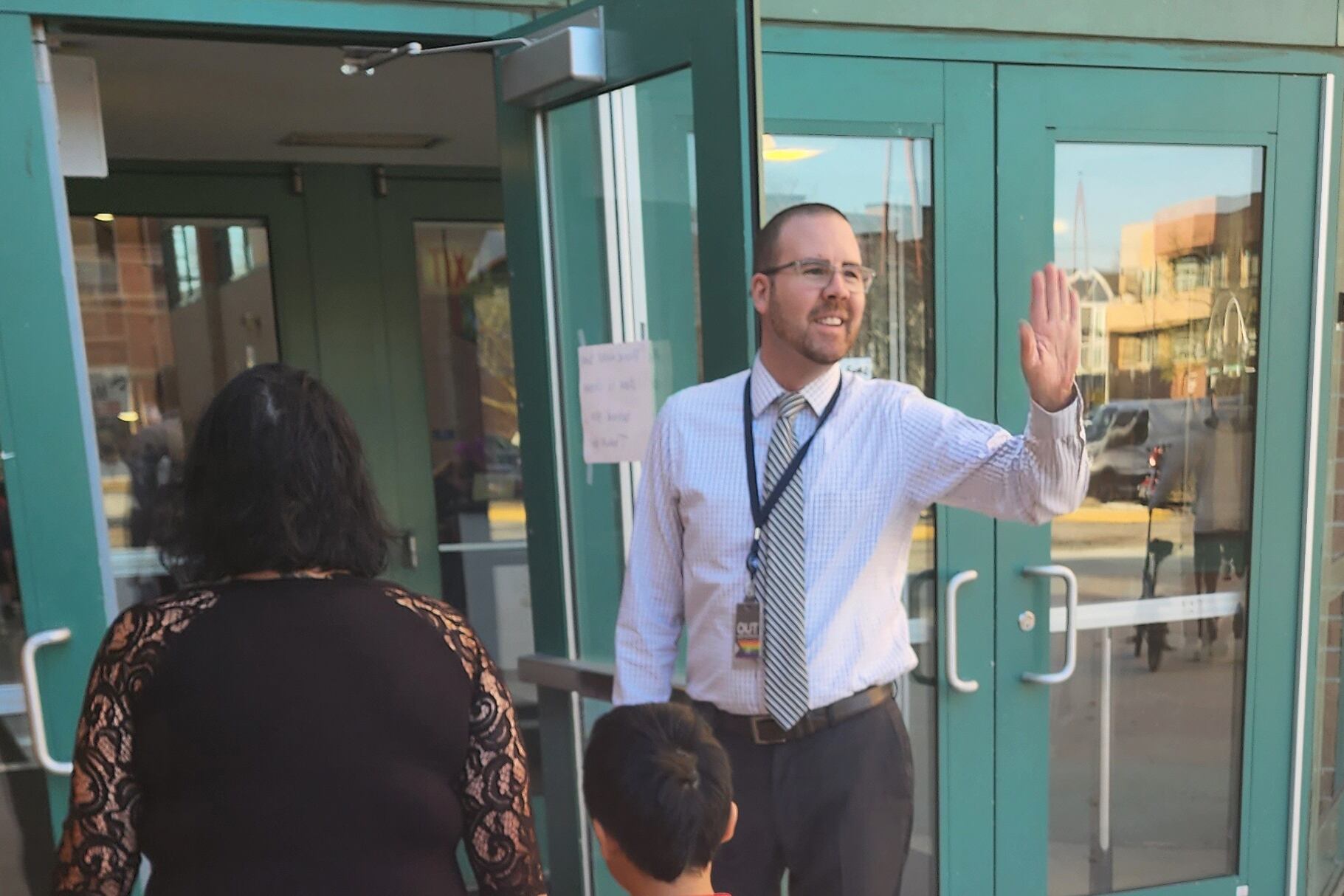A group representing Chicago’s school leaders said it plans to file a petition today to form a union, several months after state lawmakers changed the law to allow that.
The Chicago Principals & Administrators Association is submitting signatures with the Illinois Educational Labor Relations Board representing almost 80% of the district’s roughly 1,100 principals and assistant principals, according to the group’s president Troy LaRaviere. He said he hopes the district will voluntarily recognize the new union.
District officials said in a statement last week they will work with principals to comply with the new law. In the past, they have voiced concerns about principals unionizing, arguing that as managers, school leaders do not belong at a bargaining table. However, the district did not actively oppose the bill that ultimately allowed Chicago Public Schools principals to unionize.
Mayor-elect Brandon Johnson, a former teachers union organizer, said before his election that the district should recognize the union. Next, the district must file a list of school leaders with the Labor Relations Board so it can affirm more than half signed the association’s petition.
LaRaviere said the new union would advocate for improving compensation and working conditions for principals, who he said often find themselves spending too much time on bureaucratic tasks imposed by “paper-pushers downtown” rather than on strengthening instruction and other big-picture work.
The union would also empower principals to have more of a voice in shaping district’s policies and initiatives such as the district’s new school accountability system, supporters say — a move that could help better retain school leaders after a pandemic-era uptick in resignations and retirements. A key goal would be strengthening job security, from ensuring principals feel comfortable voicing concerns publicly to addressing what Raviere called “less due process than China or Russia” when principals face accusations of misconduct.
“Principals are often discouraged from saying and doing what is right for students for fear that they will be removed by CPS,” LaRaviere said.
According to the district’s latest staffing data, principals in Chicago, with the state’s highest cost of living, make $157,550 a year on average while assistant principals make $126,000. Statewide, the average principal salary was $116,400, and the average assistant principal salary was $100,000 in 2021, according to the most recent data publicly available from the Illinois State Board of Education.
Principals say union could help school leader retention
Ryan Belville, the principal at McAuliffe Elementary on the Northwest Side and a principals association member, said competitive pay is important, but his focus as a union supporter is better working conditions for principals.
He argues the district should have an assistant principal on each campus, a more consistent principal evaluation process, and a clearer principal job description, ensuring school leaders have time to offer teachers guidance in the classroom and build relationships with families and their local school councils. District staffing data suggests 40-some of the district’s 500 campuses do not have an assistant principal this school year.
“The pandemic and the responsibilities that grew during the pandemic raised additional awareness about the value of having union rights,” he said.
The American Federation of School Administrators — a national union with which Chicago’s principals association is affiliated — has said that interest in unionizing principals surged during the pandemic, which tested school leaders like never before. They found themselves overseeing school COVID testing programs and other safety measures, and filling in for support staff and substitute teaching amid severe staffing shortages.
Belville said he hopes advocacy through a new union would help improve school leader retention in the district, where he said principals like him routinely put in long hours and chip in on evenings and weekends.
“We know when we have school leadership transitions, the entire school community is disrupted,” he said.
Melissa Lyon, an expert in education labor relations at the University at Albany in New York, said it would make sense that school leaders would band together and lean on each other more amid the pandemic’s unprecedented challenges. The tight labor market and a national show of collective bargaining power, including a string of teacher strikes in recent years, are likely also factors, she said.
“It wouldn’t be a major shock that principals would look around and see they would have something to gain by coming together as a collective,” she said.
Nationally, principal unions push for more pay, less paperwork
Salary and benefit demands are typical of a newly formed principals union, Lyon said. In large urban districts with powerful teachers unions, veteran educators can sometimes make more than their supervisors in the principal’s office.
In Chicago, where the average teacher salary is $88,750, only one teacher in the district makes about $100 more a year than the district’s lowest-paid principal. Principals, however, work through the summer in Chicago, while teachers can opt to teach summer school for additional pay. And some senior educators do make more than some assistant principals.
LaRaviere said that on a per hour basis, some teachers make more than their principals and often more than assistant principals. That can discourage veteran teachers from taking on the assistant principal role, stymieing a key school leadership pipeline.
In Chicago, there’s a wide range in school leader salaries, especially for assistant principals, who make anywhere from $68,000 to $145,000. For principals, annual salaries range from $136,000 to $178,000.
In Miami-Dade County Public Schools, which recently bumped Chicago from its spot as the country’s third-largest school district, principal salaries range from $100,000 to $132,000, based on the district’s salary schedule for this school year. In New York City Public Schools, the country’s largest district, which has long had a principals union, elementary principal salaries range from about $159,000 to $175,000 depending on years of service, and high school salaries range from $170,000 to $191,000.
Nationally, concerns about protecting school leaders’ time from minor administrative tasks are widespread, Lyon said. It’s also common to see central office pushback to principal unionization efforts. District officials can argue that school leader unions slow down policy-making and hamper a district’s ability to respond nimbly to challenges; they question if supervisors need their own union.
And, Lyon said, “the district can make the case to taxpayers and families that principal salaries are high enough or question whether that money can be better spent elsewhere.”
After years of failed attempts to clear both chambers, the Illinois Legislature approved the change in state law that allowed Chicago principals to form a union in January with bipartisan support. Gov. JB Pritzker signed the legislation into law the following month. The new law prohibits principals from going on strike. It also preserves local school councils’ power to hire principals and renew their contracts.
John Brosnan, a spokesman for the Illinois Educational Labor Relations Board, said that his office will check the district’s employee list against the signatures in the petition to make sure they actually represent more than 50% of the group’s members. Union leaders often aim for at least 60% to ensure they have “a solid base going into bargaining,” Brosnan said.
If they do not have enough valid signatures in the eyes of the board, the association would get a day or so to come up with the needed signatures or the board would dismiss the petition.
If there are enough signatures, the board would certify the new union — unless the district files an objection, such as arguing the employee group has a managerial role.
But, “since there is an amendment to the law that allows principals to unionize, I can’t figure out what objection they would make,” Brosnan said.
The new state law that cleared the way for principal unionization only applies to Chicago Public Schools. The Illinois Principals Association, which did not take a position on the Chicago principal unionization bill, said so far, it has not seen a surge in interest in forming unions among principals statewide. Chicago officials have argued the right to unionize should be extended to principals across the state.
LaRaviere said he is hopeful that the Johnson administration will be supportive of their union.
“Given that the majority of the forces behind Johnson are union forces,” he said, “it would seem our chances are pretty good.”
Mila Koumpilova is Chalkbeat Chicago’s senior reporter covering Chicago Public Schools. Contact Mila at mkoumpilova@chalkbeat.org.






